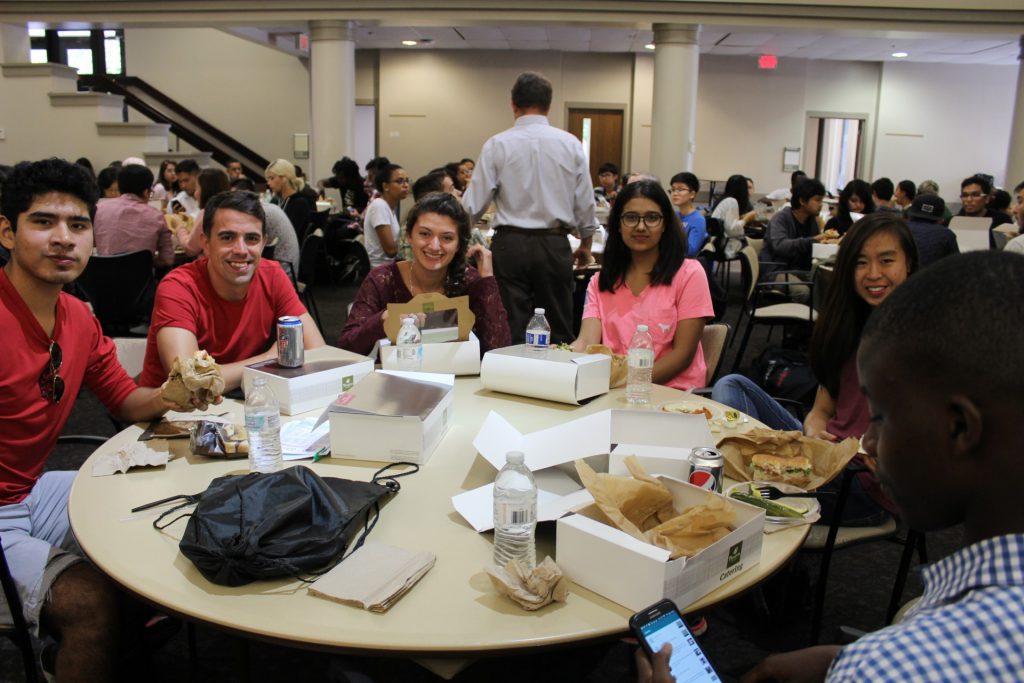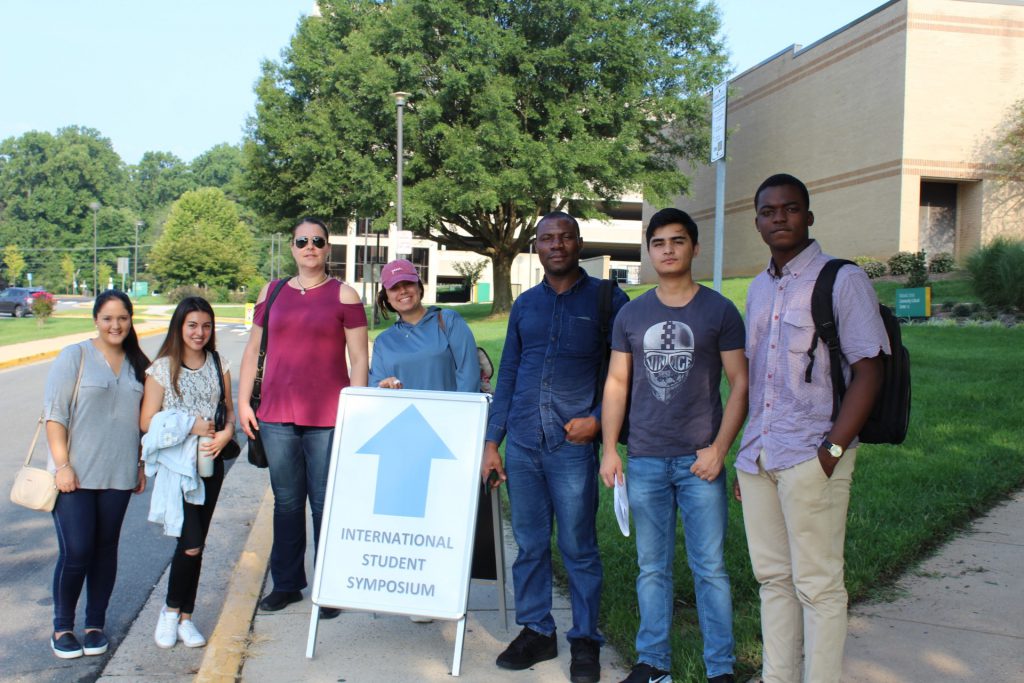The Office of International Student Services and ACLI teams welcomed over 300 new students representing over 50 countries to NOVA during the International Student symposiums held in August. We hope you have a great first semester at NOVA!
All posts by sbustillos
NOVA Fulbright Scholar to Receive Honorary Doctorate from Host Institution in Russia
Phillip Imel, associate accounting professor and a Fulbright Scholar who taught at Ural State University of Economics in Yekaterinburg, Russia, from September 2012 to June 2013, will be returning there to accept an honorary Doctor of Economics degree.
Professor Natalia Vlasova, the vice rector for international relations at the University, informed him of the honor. The decision to award the diploma was made by the University’s Academic Council. Imel and his wife will travel to the city of about 1.4 million residents in the Ural Mountains of central Russia, near Siberia, in June for the ceremony.
“Since my Fulbright experience, Russia has become my second home with Yekaterinburg and the Ural State University of Economics both holding a special place in my heart,” said Imel.
“We congratulate Phillip on this great honor, and thank him for all of his hard work and dedication,” said Celeste Dubeck-Smith, Annandale Business and Public Services Division dean.
Imel’s Fulbright project was titled “Comparative Analysis of the Russian and American Business Systems.” He taught three regular courses and several seminars at the university while performing research for a paper he presented at an international conference on global capital markets at the university.
He worked to introduce methods and techniques to the finance and accounting curricula at Ural State University to allow students to transfer their academic credentials to other countries. This came out of his experience meeting students at NOVA who were respected professionals in their home countries, but had to take remedial courses to qualify for positions in the U.S.
Imel and his wife also helped students planning to transfer to U.S. colleges prepare to take the ACT college readiness assessment test. He noted that Ural State University is more international than most Russian universities.
Imel attended Ashland Community College and Morehead State University in Kentucky and has done doctoral work at the University of Virginia. Prior to coming to NOVA, he taught at Southwest Virginia Community College where he had the opportunity to travel to Russia five times through a U.S. State Department exchange program with Russian universities.
In the process, he learned to speak Russian and says he fell in love with the country. “I enjoyed Yekaterinburg so much because it is near Siberia about a thousand miles from Moscow, and you are among the real true Russian people,” he said.
He added that it is much like the mountainous rural Kentucky where he grew up.
http://blogs.nvcc.edu/intercom/2015/02/16/phillip-imel-to-receive-honorary-doctorate-in-russia/
NOVA Fulbrights Highlighted in Chronicle for Higher Education article
Fulbright Program Seeks to Get More Community Colleges Involved in Exchanges
When someone mentions the Fulbright Program, it often evokes images of venerable researchers from elite institutions traveling to far-flung corners of the world. But the U.S. State Department is doing more to make sure that faculty members and others from community colleges also benefit from the exchange program, with the goal of getting more international perspectives into community-college campuses and classrooms.
Like those enrolled at four-year colleges, community-college students will be entering an increasingly globalized work force. But they often have fewer opportunities to study abroad because many of them work, have families, or face financial hardships. What’s more, while more international students are coming to community colleges in recent years, students from overseas tend to enroll at research institutions—meaning students at two-year institutions have far fewer opportunities to meet or share views with a foreign peer.
To help bridge that global-knowledge gap, the department’s Bureau of Educational and Cultural Affairs, which administers Fulbright, says it plans to step up efforts to promote opportunities to students, instructors, and administrators at two-year institutions. In emails, webinars, and presentations at community-college events, it’s pitching exchanges, like one that sends community-college administrators to Russia for two weeks to share ideas about vocational education.
The Fulbright Program, which is actually a collection of a dozen or sodifferent exchanges, is also promoting several that bring foreign scholars or language instructors to teach at community colleges, minority-serving institutions, and small liberal-arts colleges.
‘International Awareness’
Hosting foreign participants helps campuses enhance language instruction, while “sending faculty and administrators abroad provides them with the skills needed to jump-start campus internationalization and build long-term connections abroad,” Meghann Curtis, the department’s deputy assistant secretary of state for academic programs, wrote in an email to The Chronicle. The department says the focus on community colleges dovetails with the White House’s recent spotlight on the important role played by two-year institutions.
To be sure, top-tier universities will probably always produce the most scholars who win Fulbright awards to go abroad. Applicants generally need a Ph.D. to participate in the core U.S. Scholar program, but community-college instructors lacking doctorates can apply for grants through thestudent program, which requires only a bachelor’s degree.
Community colleges are working to make sure that instructors on their campuses are aware of such opportunities.
“We’re trying to get the word out that not all Fulbrights require Ph.D.’s and that community-college faculty can be just as competitive,” said Stacey Bustillos, a former Fulbright program officer who coordinates international programs for Northern Virginia Community College. Because their main focus is on teaching, “their experiences will have a direct impact in the classroom.”
Ms. Bustillos has posted notices and co-hosted events with the college’s Center for Excellence in Teaching and Learning, and has offered sessions at pedagogy workshops on how to apply for grants.
With 1,900 international students and a growing immigrant population in the region, Northern Virginia has jumped on the opportunity Fulbright provides to expand its global reach. Four faculty members have won grants to study abroad—in Russia, Bosnia, and South Korea—in the past few years, and the system’s six campuses have taken turns hosting scholars from China and India.
“We have 180 countries represented across our students, faculty, and staff, so bringing in outside perspectives and cultural sensitivities is extremely important,” Ms. Bustillos said.
Miguel B. Corrigan, an associate professor of business at Northern Virginia’s Loudoun campus, spent last year teaching entrepreneurship and related topics at a college in Saratov, Russia. Next year a scholar he linked up with there, whose academic interests include fighting corruption, will come to the Virginia college to teach public administration.
Among other participating institutions, Broward College, in Florida, has developed partnerships with campuses in Russia; Skyline College, in California, offers Tagalog classes taught by teaching assistants from the Philippines; and Davidson County Community College, in North Carolina, has Arabic and Russian instruction taught by native speakers.
“About 40 percent of our students will go directly into the work force, where globalization is becoming increasingly important,” said Wayne C. Wheeler, director of international programs and services for the American Association of Community Colleges. “Since study abroad isn’t a viable option for many of our students, the Fulbright Program is one way colleges can bring the world to their campuses.”
Katherine Mangan writes about community colleges, completion efforts, and job training, as well as other topics in daily news. Follow her on Twitter@KatherineMangan, or email her at katherine.mangan@chronicle.com.
When someone mentions the Fulbright Program, it often evokes images of venerable researchers from elite institutions traveling to far-flung corners of the world. But the U.S. State Department is doing more to make sure that faculty members and others from community colleges also benefit from the exchange program, with the goal of getting more international perspectives into community-college campuses and classrooms.
Like those enrolled at four-year colleges, community-college students will be entering an increasingly globalized work force. But they often have fewer opportunities to study abroad because many of them work, have families, or face financial hardships. What’s more, while more international students are coming to community colleges in recent years, students from overseas tend to enroll at research institutions—meaning students at two-year institutions have far fewer opportunities to meet or share views with a foreign peer.
To help bridge that global-knowledge gap, the department’s Bureau of Educational and Cultural Affairs, which administers Fulbright, says it plans to step up efforts to promote opportunities to students, instructors, and administrators at two-year institutions. In emails, webinars, and presentations at community-college events, it’s pitching exchanges, like one that sends community-college administrators to Russia for two weeks to share ideas about vocational education.
The Fulbright Program, which is actually a collection of a dozen or sodifferent exchanges, is also promoting several that bring foreign scholars or language instructors to teach at community colleges, minority-serving institutions, and small liberal-arts colleges.
‘International Awareness’
Hosting foreign participants helps campuses enhance language instruction, while “sending faculty and administrators abroad provides them with the skills needed to jump-start campus internationalization and build long-term connections abroad,” Meghann Curtis, the department’s deputy assistant secretary of state for academic programs, wrote in an email to The Chronicle. The department says the focus on community colleges dovetails with the White House’s recent spotlight on the important role played by two-year institutions.
To be sure, top-tier universities will probably always produce the most scholars who win Fulbright awards to go abroad. Applicants generally need a Ph.D. to participate in the core U.S. Scholar program, but community-college instructors lacking doctorates can apply for grants through thestudent program, which requires only a bachelor’s degree.
Community colleges are working to make sure that instructors on their campuses are aware of such opportunities.
“We’re trying to get the word out that not all Fulbrights require Ph.D.’s and that community-college faculty can be just as competitive,” said Stacey Bustillos, a former Fulbright program officer who coordinates international programs for Northern Virginia Community College. Because their main focus is on teaching, “their experiences will have a direct impact in the classroom.”
Ms. Bustillos has posted notices and co-hosted events with the college’s Center for Excellence in Teaching and Learning, and has offered sessions at pedagogy workshops on how to apply for grants.
With 1,900 international students and a growing immigrant population in the region, Northern Virginia has jumped on the opportunity Fulbright provides to expand its global reach. Four faculty members have won grants to study abroad—in Russia, Bosnia, and South Korea—in the past few years, and the system’s six campuses have taken turns hosting scholars from China and India.
“We have 180 countries represented across our students, faculty, and staff, so bringing in outside perspectives and cultural sensitivities is extremely important,” Ms. Bustillos said.
Miguel B. Corrigan, an associate professor of business at Northern Virginia’s Loudoun campus, spent last year teaching entrepreneurship and related topics at a college in Saratov, Russia. Next year a scholar he linked up with there, whose academic interests include fighting corruption, will come to the Virginia college to teach public administration.
Among other participating institutions, Broward College, in Florida, has developed partnerships with campuses in Russia; Skyline College, in California, offers Tagalog classes taught by teaching assistants from the Philippines; and Davidson County Community College, in North Carolina, has Arabic and Russian instruction taught by native speakers.
“About 40 percent of our students will go directly into the work force, where globalization is becoming increasingly important,” said Wayne C. Wheeler, director of international programs and services for the American Association of Community Colleges. “Since study abroad isn’t a viable option for many of our students, the Fulbright Program is one way colleges can bring the world to their campuses.”
Katherine Mangan writes about community colleges, completion efforts, and job training, as well as other topics in daily news. Follow her on Twitter@KatherineMangan, or email her at katherine.mangan@chronicle.com.
http://chronicle.com/article/Fulbright-Program-Seeks-to-Get/189977/
Apply for a Fulbright Scholar Award 2016/17
The Fulbright Scholar Award Catalog has been released for teaching and research opportunities for the 2016/17 academic year. The online application deadline is Monday, August 3rd, 2015 but it is advised to plan in advance particularly when letters of invitation from international institutions are required.
- 560 total awards available
- 173 do NOT require a PhD
- Several awards mention community college faculty specifically
You can find more information on the application process and other resources here.
Some awards that may particularly interest community college faculty but not limited to;
#6103 Malaysia
#6181 Denmark
#6315 and #6316 Russia
#6433 India
#6438 Kyrgyz Republic
#6451 Barbados and Eastern Caribbean
#6503 Jamaica
#6076 Cambodia
#6107 Philippines
#6118 Vietnam
Many Teaching English as a Foreign Language (TEFL) awards world-wide
NOVA has been the leading community college awarded with the most Fulbright Scholars during 2012/13 and 2013/14 with several other faculty recently awarded for 2015/16.
The Fulbright Scholar award is an individual application but NOVA’s Fulbright campus representative, Stacey Bustillos (sbustillos@nvcc.edu), is available to provide you with guidance in award selection strategies, tips for writing a competitive application and potential leads for international letters of invitation.
Fulbright Scholar to Speak at Alexandria campus on Feb. 11th
Northern Virginia Community College – Alexandria Campus
Lyceum Series Event!
This event is FREE and OPEN TO ALL!
For the Spring 2015 semester, we have our first Lyceum Series event!
 Dr. Zubair Meenai is a Fulbright Scholar in Residence, visiting NOVA and George Mason University this semester from Jamia Millia Islamia, a university in New Delhi, India.
Dr. Zubair Meenai is a Fulbright Scholar in Residence, visiting NOVA and George Mason University this semester from Jamia Millia Islamia, a university in New Delhi, India.
He will be talking with us about a field he has worked extensively in.
India’s Experience with Public Health Programmes: A Case Study of Polio Eradication in Western Uttar Pradesh
Wed, 02-11-15
2pm-3pm
Bisdorf Building, Room AA-158.
NOVA-Alexandria
5000 Dawes Ave
Alexandria, VA 22311
Maps and Directions to get to the NOVA-Alexandria Campus: http://www.nvcc.edu/about-nova/maps-directions/alexandria/index.html
Dr. Meenai’s recent professional responsibilities include the following:
- Professor, UGC Centre of Advanced Study, Department of Social Work, Jamia Millia Islamia since 2006.
- Director, Centre for Early Childhood Development & Research, Jamia Millia Islamia since 2010.
- Head, UGC Centre of Advanced Study, Department of Social Work, Jamia Millia Islamia from 2010-2013
- Coordinator, Research & Resource Unit on Social Work with Minorities, UGC Centre of Advanced Study in Social Work, Jamia Millia Islamia from 2010.
- Project Director of the UNICEF supported “Project on Advocacy and Networking for Health among Under Served” in Western Uttar Pradesh from 2003-2013.




